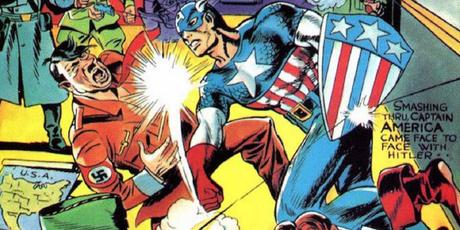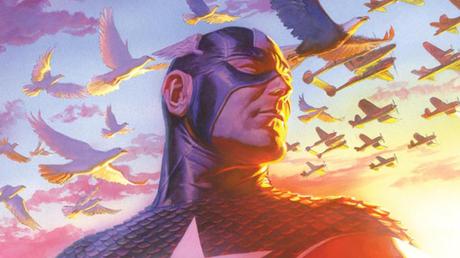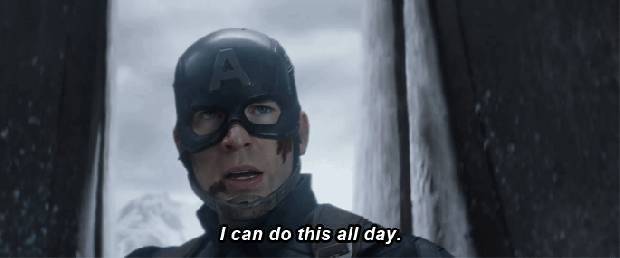Captain America is one of he oldest and most enduring superheros in fiction. He got started back during WWII when two Jewish-Americans tried to smack Adolf Hitler the best way they could: writing fiction. That might sound underwhelming, but art is a powerful force that is constantly underestimated. The details might occasionally change, but the broad-strokes remain the same. He starts out as scrawny New Yorker, Steve Rogers. He is determined to volunteer to support the Allied forces, but he is constantly denied his chance due to the aforementioned scrawniness. This determination got the attention of Nazi-fleeing German scientist, Dr. Abraham Erskine. Rogers is chosen for "Project: Rebirth" and receives a serum that turns him into a super-soldier. Unfortunately, a Nazi collaborator kills Erskine, who takes the secret ingredient to his grave. Now, as the only super soldier, Rogers is branded as Captain America, a walking talking propaganda poster who stormed into Nazi-occupied territory to turn the tide of the war. Unfortunately, it ended with him taking a dip in the drink and going into a state of suspended animation only to wake up in whatever present was most convenient for the current crop of writers. The Marvel Cinematic Universe version, the version that might be the single best depiction of a superhero on the big screen, woke up in 2012, just in time for The Avengers movie.

While the cinematic Cap was on ice, a lot happened to America. Korea. Vietnam. Cuban Missile Crisis. Kennedy Assassination. Watergate Scandal. The Cold War. Eventually, September 11th. America lost its innocence, and our depictions of heroes changed along the way. The adversity that dramatic leads were overcoming (if at all) were much more psychological, like practically all of the characters played by Al Pacino and Robert DeNiro in the beginning of their careers. Our action heroes got grittier and grittier. Sure, John Wayne was plenty gritty, but by the time that Clint Eastwood started making Westerns, the idea of black hats and white hats being moral opposites was long gone. There is only dusty brown hats. Eastwood also started kicking ass with a badge in Dirty Harry, and that gave way to the sarcastic assholes played by the likes of Bruce Willis and Mel Gibson in the 80s and 90s.
And then peak TV happened. Oh peak TV. "The Sopranos" to "Breaking Bad"/"Mad Men," and all the FX and HBO shows about people behaving badly in-between. It was truly (still is really) the age of the anti-hero. Anti-heroes are a very specific group of characters. They aren't just one-liner spewing assholes who still get the job done despite not being the most likable character ever. Think Max in Road Warrior. He didn't really want to help that group of people from the gang. He offered to help for his fair share of the gasoline. Or Jack Sparrow in the first Pirates of the Caribbean . He didn't really care about Orlando Bloom or Keira Knightly's characters (at least not at first). He just wanted his boat back. To do that, conveniently meant also doing the heroic thing. They were heroes by accident, learning what it meant to be heroic while on the mission, and for a long time, we believed that made them more interesting than the characters from yesteryear. Those characters were rendered boring by their niceness and perfect morals.

That was the fear when it came to reintroducing Captain America in the 21st century. Is he just going to come off like some Dudley Do-Right knockoff? Some Mighty Mouse style hero with his chest puffed out, his hands on his waist, proclaiming"I'm here to save the day" before untying the damsel from the train tracks and socking the mustache twirler in the nose? It is a legitimate fear because we could have been super close to getting that. But Chris Evans didn't deliver that. Joe Johnston, Joss Whedon, the Russo Brothers, and Kevin Fiege didn't deliver that. They delivered something much better. They re-contextualized that character for a new era. Together, they portrayed Cap more like a Frank Capra character by internalizing that struggle to be moral. Cap struggles to remain benevolent in a world that increasingly cares less and less if you are. There is no karma in this world, and without some cosmic reward system, people give up (or so we think). Cap doesn't, and that's important. The easy way and the right way are so often not the same thing that the right way needs a champion.
That has been ingrained into Cap's being from the very beginning. His debut issue might carry a cover date of May 1941, but it actually went on sale in December 1940, a full year before Pearl Harbor was attacked dragging the US into the war. The choice to make him a Nazi's worst nightmare earned them hate mail, death threats, and a gang of loitering protesters that required police intervention. For what? Creating a character that stood for the basest American ideals to fight an enemy so easy to vilify it is a surprise he wasn't created by a comic book writer in the first place. It has always been an uphill battle for Cap to do the right thing. That is what makes him a great character despite being "too nice."


